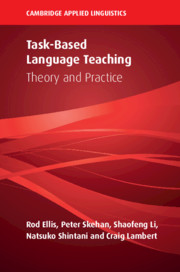Book contents
- Task-Based Language Teaching
- The Cambridge Applied Linguistics Series
- Task-Based Language Teaching
- Copyright page
- Contents
- Figures
- Tables
- Series Editors’ Preface
- Authors’ Preface
- Part I Introduction
- Part II Theoretical Perspectives
- 2 Cognitive-Interactionist Perspectives
- 3 Psycholinguistic Perspectives
- 4 Sociocultural Perspectives
- 5 Psychological Perspectives
- 6 Educational Perspectives
- Part III Pedagogical Perspectives
- Part IV Investigating Task-Based Programmes
- Part V Moving Forward
- Endnotes
- References
- Index
4 - Sociocultural Perspectives
from Part II - Theoretical Perspectives
Published online by Cambridge University Press: 07 October 2019
- Task-Based Language Teaching
- The Cambridge Applied Linguistics Series
- Task-Based Language Teaching
- Copyright page
- Contents
- Figures
- Tables
- Series Editors’ Preface
- Authors’ Preface
- Part I Introduction
- Part II Theoretical Perspectives
- 2 Cognitive-Interactionist Perspectives
- 3 Psycholinguistic Perspectives
- 4 Sociocultural Perspectives
- 5 Psychological Perspectives
- 6 Educational Perspectives
- Part III Pedagogical Perspectives
- Part IV Investigating Task-Based Programmes
- Part V Moving Forward
- Endnotes
- References
- Index
Summary
Chapter 4 offers a sociocultural perspective on tasks. In sociocultural theory a ‘task’ is viewed an artefact for mediating learning through interaction. It views ‘task’ as always interpreted by the participants so that what the task is intended to achieve (i.e. the task-as-workplan) may well not match what the task actually achieves when it is performed (i.e. the task-as-process). Like the cognitive-interactionist perspective, the sociocultural perspective views tasks in terms of the interactions they give rise, emphasizing the importance of the collaborative nature of the interaction for ‘learning’ (defined as other-regulation) and for ‘development’ (defined as self-regulation). It reviews a range of research that has investigated tasks from a sociocultural perspective, including studies involving ‘languaging’, dynamic assessment and Concept-based Language Instruction.
Keywords
- Type
- Chapter
- Information
- Task-Based Language TeachingTheory and Practice, pp. 103 - 128Publisher: Cambridge University PressPrint publication year: 2019

